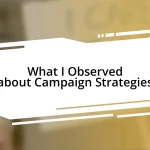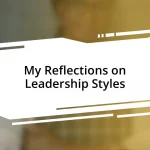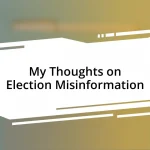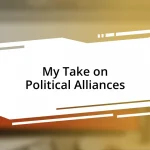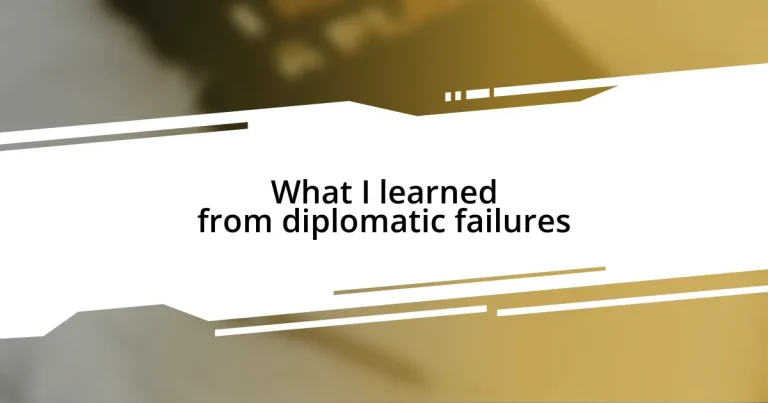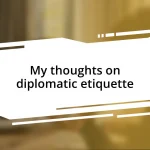Key takeaways:
- Diplomatic failures often arise from miscommunication, cultural ignorance, and the lack of empathy and trust between nations.
- Key historical failures include the Treaty of Versailles, which led to humiliation for Germany, and the Cuban Missile Crisis, marked by ineffective communication.
- Successful recoveries, such as South Africa post-apartheid and the U.S.-Vietnam relationship, highlight the importance of forgiveness, mutual benefit, and open dialogue.
- Empathy and clarity in communication are essential for effective diplomacy, as building personal relationships can lead to constructive partnerships.
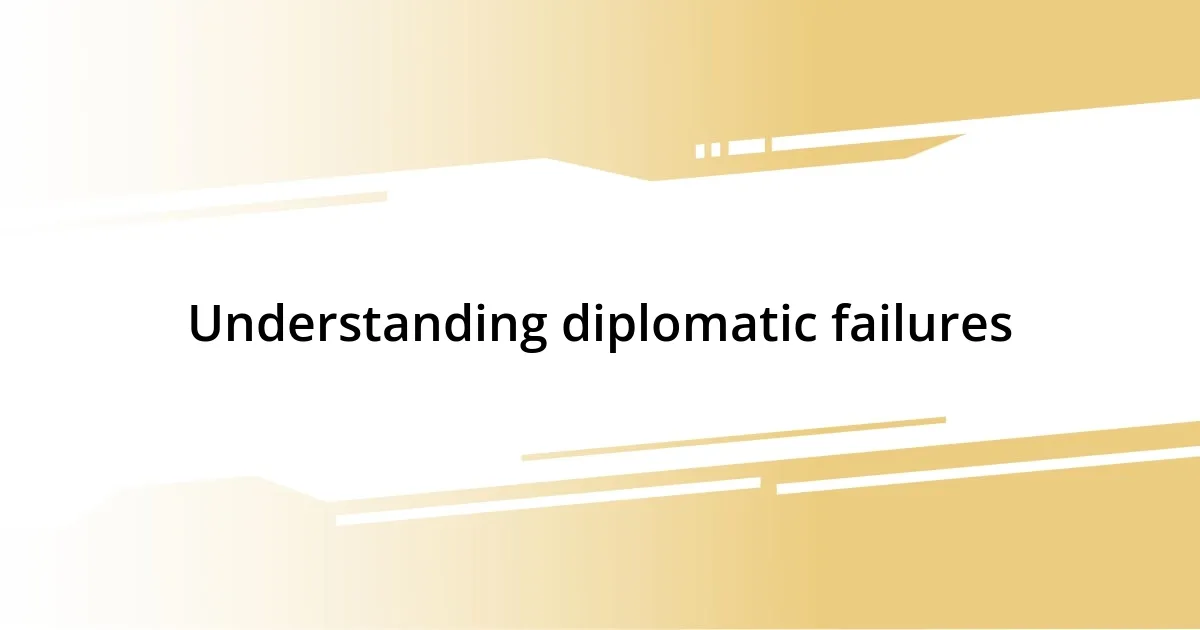
Understanding diplomatic failures
Diplomatic failures often stem from miscommunication and misunderstanding between nations. I remember when I witnessed a significant international summit where differing cultural norms led to a complete breakdown of negotiations. It made me realize how crucial it is to fully grasp not just the words spoken but the intent and cultural weight behind them—something that can easily get lost in translation.
Have you ever thought about how personal relationships mirror international diplomacy? When I faced a misunderstanding with a close friend, it felt so similar to the rifts that occur between countries. Emotions can cloud our judgment, and I learned that empathy is essential. Without it, even the most well-meaning intentions can spiral into diplomatic disasters.
We often overlook the small yet powerful role that trust plays in diplomacy. I’ve seen firsthand how a single misplaced comment can erode decades of goodwill and rapport between nations. It’s fascinating—and a bit heartbreaking—when you consider how a simple breakdown in trust can lead to broader conflicts and crises that affect countless lives.
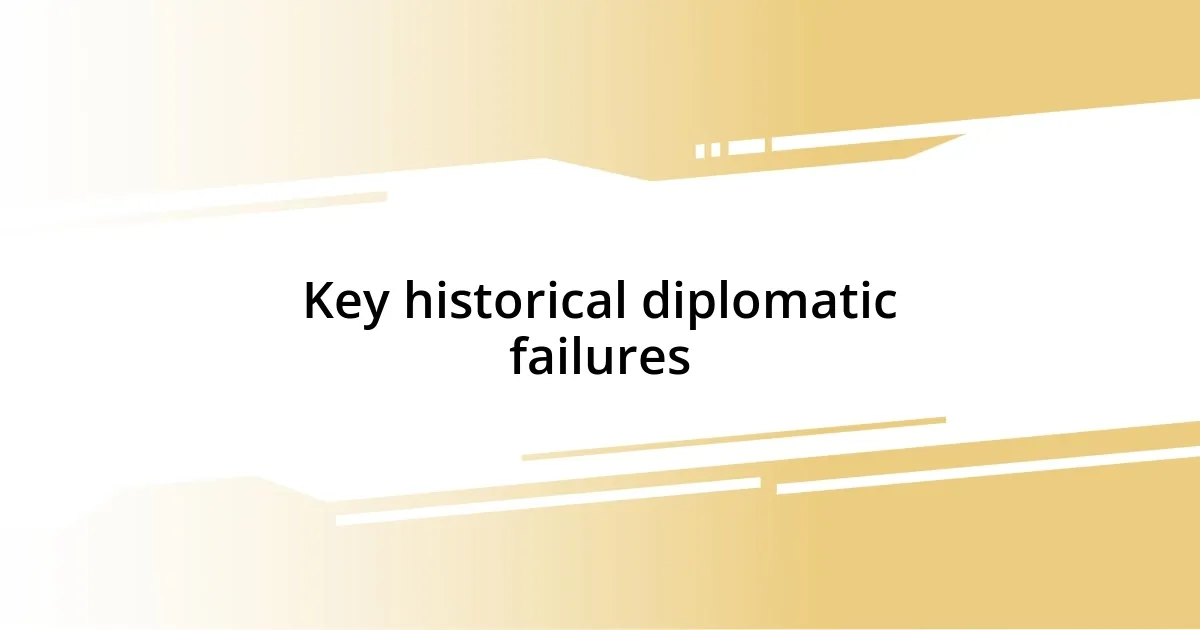
Key historical diplomatic failures
When we delve into key historical diplomatic failures, one glaring example stands out: the Treaty of Versailles in 1919. This treaty, which aimed to establish lasting peace after World War I, instead sowed discontent, particularly in Germany. I remember reading about how punitive reparations and territorial losses fueled a sense of humiliation, leading to the rise of extremism. It dawned on me how often a well-intentioned agreement can backfire if not approached with a spirit of understanding and compromise.
Another significant failure was the U.S. and Soviet Union’s inability to communicate effectively during the Cuban Missile Crisis. With the world teetering on the brink of nuclear war, it’s chilling to think how close we were to catastrophe. I can’t help but reflect on how some intense arguments I’ve had often stem from a lack of clarity. In those moments of heated debate, it’s crucial to pause, breathe, and really hear what the other person is trying to say—something leaders failed to do back then.
Finally, the collapse of the League of Nations is another cautionary tale of diplomacy gone wrong. Despite its idealistic vision, it struggled to gain the necessary authority and support from major powers. From my perspective, it reminds me of group projects where one member doesn’t pull their weight, leading to failure for everyone involved. If established organizations can’t garner commitment from their key players, they inevitably risk losing credibility, relevance, and ultimately, their very reason for existence.
| Diplomatic Failure | Key Issue |
|---|---|
| Treaty of Versailles (1919) | Punitive reparations and humiliation of Germany |
| Cuban Missile Crisis | Lack of effective communication leading to nuclear brinkmanship |
| Collapse of the League of Nations | Inadequate support and authority from major powers |
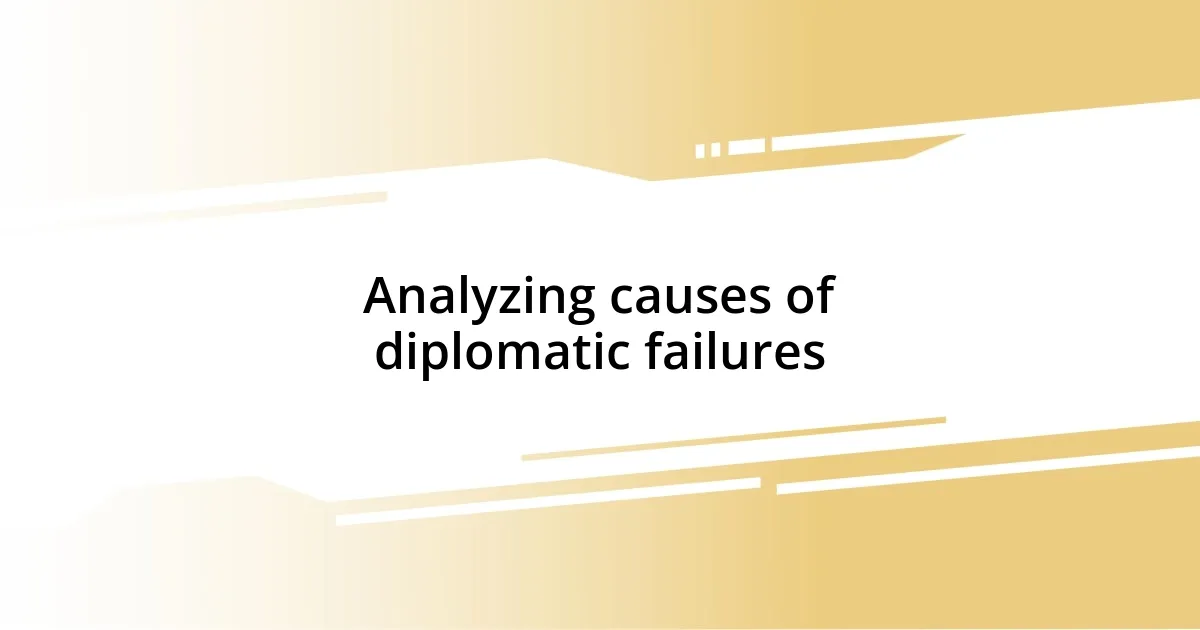
Analyzing causes of diplomatic failures
Analyzing diplomatic failures reveals several key causes that often intertwine in complex ways. One aspect that stands out is the frequent disregard for historical context. I recall a negotiation I observed where one side underestimated the deep-seated grievances stemming from past interactions. Without acknowledging history, it’s like trying to build a house on sand—it just won’t hold up.
Here’s a closer look at some common causes of diplomatic failures:
- Miscommunication: Often, messages are not conveyed or interpreted accurately, leading to confusion and mistrust.
- Cultural Ignorance: Failing to respect and understand cultural differences can alienate negotiating partners, preventing meaningful dialogue.
- Inflexibility: Stubbornness in negotiations can create stalemates, as I’ve seen in various discussions where parties refused to budge even slightly.
- Overlooking External Influences: Geopolitical factors and pressure from domestic politics can heavily sway decisions. I remember a case where a mere tweet influenced international relations.
These factors serve as stark reminders that diplomacy requires nuance and sensitivity, much like maintaining a delicate friendship. When I’ve had to patch things up with friends, it was often about understanding their point of view rather than just pushing my agenda.
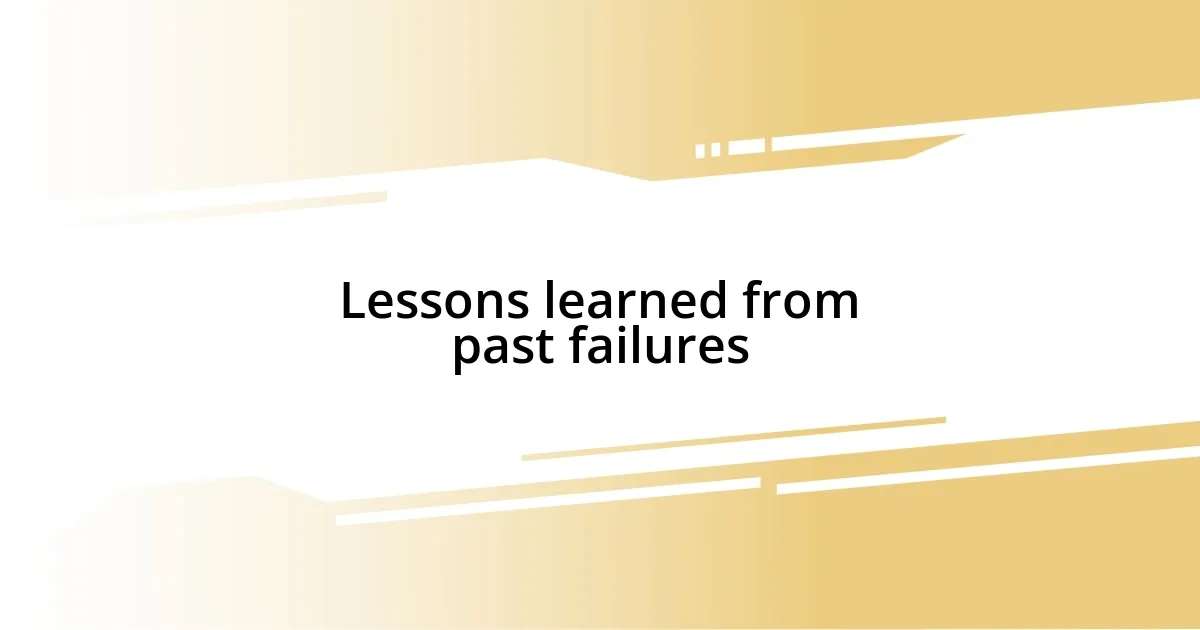
Lessons learned from past failures
In reflecting on past diplomatic failures, I’ve learned that humility is paramount. For instance, after witnessing a heated debate within a community meeting where egos flared, I realized how easily discussions can derail from their intended goals. It’s a lesson that resonates on a global scale; when negotiators cling too tightly to their positions, they might overlook the potential for compromise and mutual understanding. Isn’t it fascinating how the desire to win can sometimes blind us to more constructive paths?
Another pivotal lesson stems from the Cuban Missile Crisis. I remember reading about how moments of tension can send individuals into defensive reactions, clouding their judgment. I relate this to a time when I found myself locked in an argument with a friend. Instead of truly listening, I was only focused on defending my viewpoint. In diplomacy, this failure to engage transparently can lead to catastrophic outcomes, as we saw in those fateful days. It reinforces the importance of cultivating clear lines of communication—after all, don’t we all seek to be heard and understood?
Finally, the Treaty of Versailles showcases how punitive measures rarely foster peace. When I faced a tough situation with colleagues where blame overshadowed solutions, it struck me how counterproductive such approaches can be. Punishment often breeds resentment. I believe this happens in international relations too; when parties focus on retribution rather than reconciliation, they sow the seeds of future conflict. Isn’t it crucial for leaders today to reflect on this? By prioritizing connection over condemnation, a more hopeful world can emerge.
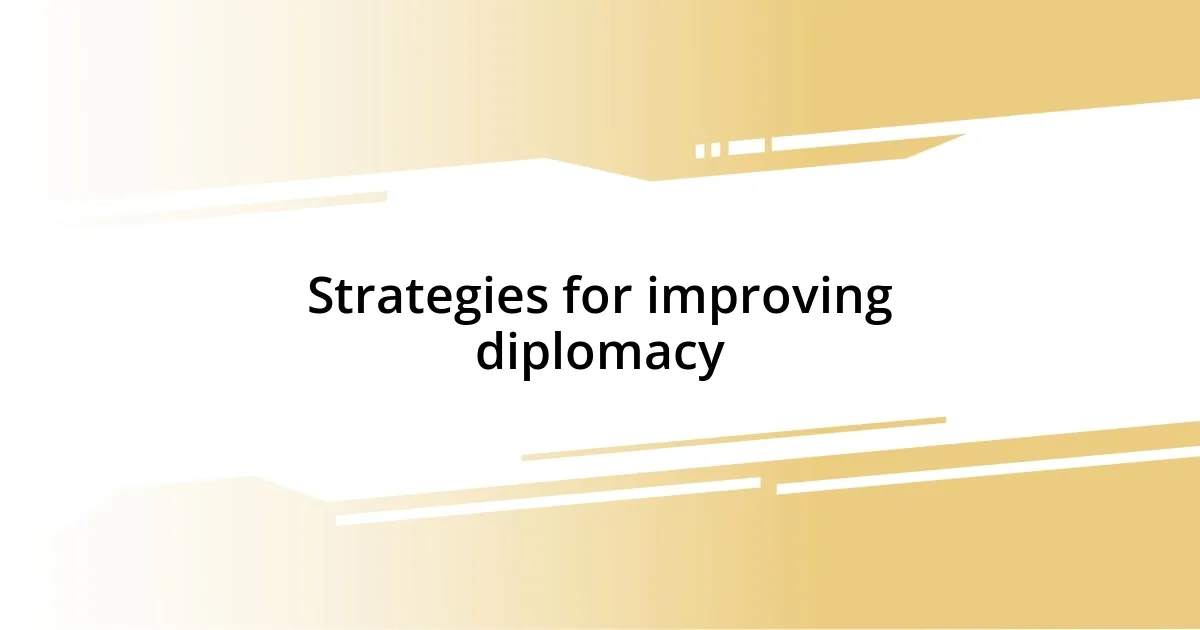
Strategies for improving diplomacy
To improve diplomacy, fostering open communication is essential. I’ve seen firsthand how small misunderstandings can balloon into significant issues. Remember a time when I candidly shared my thoughts during a team meeting? The atmosphere shifted positively because everyone felt safe to express their concerns. This kind of openness should be embraced on a larger stage, creating room for honest dialogues that preempt escalation.
Another strategy is to invest time in cultural competence. I once navigated a complex project with an international team, and understanding their cultural practices made a difference. The way they celebrate success, for instance, taught me not only about their values but also how to connect with them on a personal level. Isn’t it surprising how a little cultural knowledge can unlock deeper partnerships? Diplomats, too, should delve into the histories and customs of their counterparts to build bridges rather than walls.
Moreover, adaptability is crucial in diplomatic discussions. I recall a negotiation where we faced an unexpected obstacle; instead of clinging to the original agenda, we pivoted and found common ground. This flexibility not only salvaged our project but also strengthened relationships. In the world of diplomacy, being willing to reassess strategies on the fly can turn potential failures into opportunities—how often do we miss similar chances in our own negotiations simply because we refuse to be flexible? Embracing this mindset could lead to groundbreaking progress globally.

Case studies of successful recoveries
One compelling case study of successful recovery in diplomacy is the reconciliation between South Africa and its former adversaries post-apartheid. I vividly remember watching the Truth and Reconciliation Commission hearings and feeling a mix of hope and apprehension. Here was a nation grappling with deep divides, yet instead of retaliatory measures, leaders like Nelson Mandela emphasized forgiveness and understanding. This commitment to acknowledging past atrocities without seeking revenge truly transformed the societal landscape. Isn’t it remarkable how facing uncomfortable truths can pave the way for healing?
Another poignant example is the U.S. and Vietnam’s journey post-Vietnam War. During my research, I was struck by how the two nations transitioned from bitter enemies to trading partners. The U.S. Embassy’s reopening in 1995 marked not just a diplomatic gesture but a shared recognition of mutual benefit and growth. I’ve seen similar dynamics play out in my own circles where a simple act of reaching out after a conflict can lead to newfound respect and collaboration. Don’t you find it inspiring that sometimes, the most meaningful relationships blossom from our greatest challenges?
Lastly, the 2015 Iran nuclear deal highlighted how negotiations can evolve even after profound mistrust. As I read about the extensive back-and-forth that led to this agreement, I couldn’t help but reflect on my own experiences with negotiation. I recall a time when I had to collaborate with a colleague I didn’t see eye-to-eye with. Our initial discussions were fraught with tension, yet by prioritizing dialogue and understanding, we turned the situation around. It’s fascinating to see how a careful blend of persistence and openness can yield diplomatic breakthroughs, right? Being willing to put aside previous grievances creates space for positive change and progress.
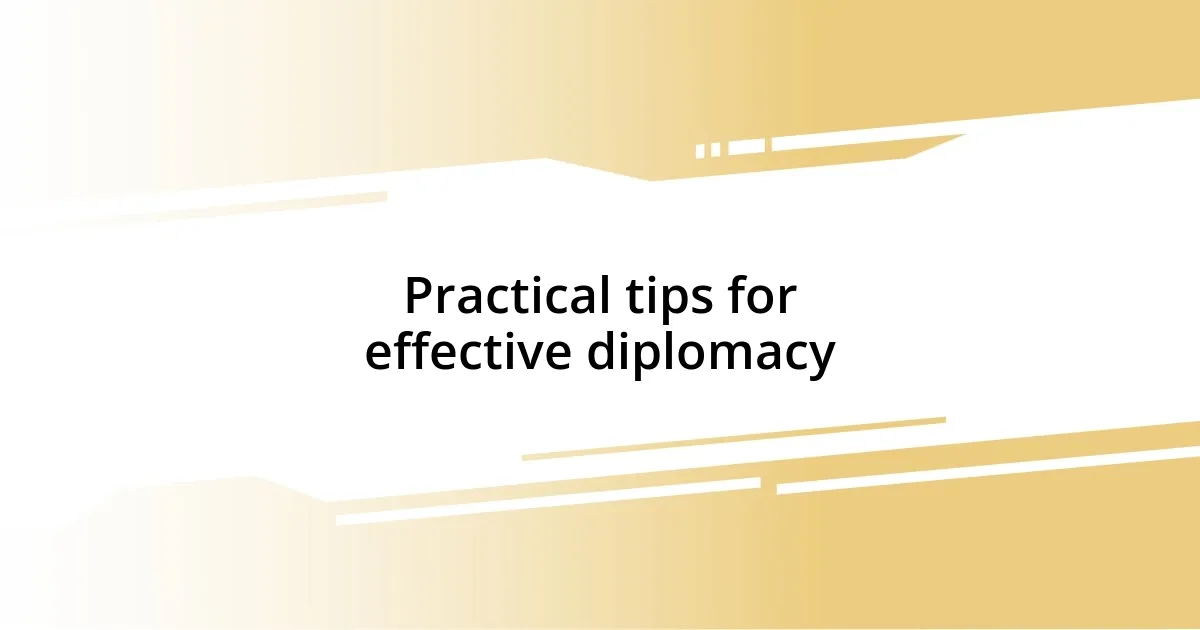
Practical tips for effective diplomacy
Fostering empathy is a cornerstone of effective diplomacy. I remember a time when I was involved in managing a conflict between colleagues with starkly different perspectives. During a tense discussion, I encouraged each person to share their viewpoints while actively listening. The outcome was extraordinary—by genuinely trying to understand each other, they found common ground and a renewed sense of collaboration. It’s fascinating how empathy can diffuse tension, isn’t it? Diplomats can greatly benefit from this approach by considering the feelings and motivations of their counterparts, which often opens doors to constructive dialogue.
I’ve also found that clarity in messaging can make all the difference. In one of my past presentations, I faced confusion due to mixed signals in my communication. I learned that clear, straightforward language not only avoids misunderstandings but also builds trust. When diplomats articulate their intentions and expectations unambiguously, it paves the way for more fruitful negotiations. Don’t you think that clarity could eliminate a lot of the misinterpretations we often see in international relations?
Lastly, I advocate for the power of building personal relationships. I once attended an international conference where casual interactions over coffee led to deeper conversations around shared goals. These informal moments broke down barriers far more effectively than any formal meeting could. I’ve witnessed how establishing rapport can lead to unexpected collaborations down the line. Isn’t it incredible how a simple chat can set the stage for long-lasting partnerships? Diplomacy thrives on these connections, making it vital for diplomats to seek opportunities for genuine engagement beyond the table.


